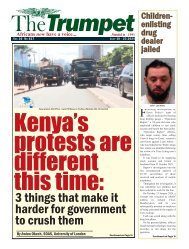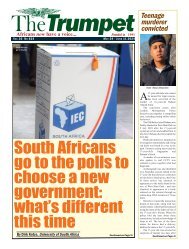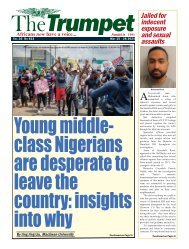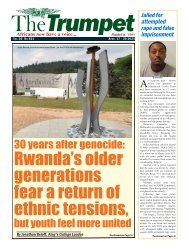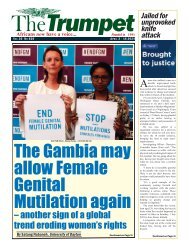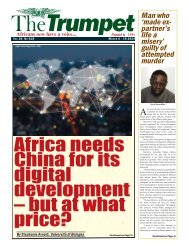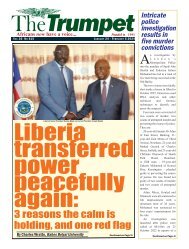The Trumpet Newspaper Issue 616 (February 7 - 20 2024)
Mali, Burkina Faso and Niger want to leave ECOWAS
Mali, Burkina Faso and Niger want to leave ECOWAS
You also want an ePaper? Increase the reach of your titles
YUMPU automatically turns print PDFs into web optimized ePapers that Google loves.
<strong>The</strong><strong>Trumpet</strong><br />
Africans now have a voice... Founded in 1995<br />
V O L 30 N O <strong>616</strong> F E B R U A R Y 7 - <strong>20</strong> <strong>20</strong>24<br />
ECOWAS HQ Abuja<br />
Poll reveals<br />
seeking<br />
professional<br />
support<br />
improves<br />
mental<br />
health<br />
Mali, Burkina<br />
Faso and<br />
Niger want<br />
to leave<br />
ECOWAS:<br />
A political scientist<br />
explains the fallout<br />
By Olayinka Ajala, Leeds Beckett University<br />
Continued on Page 2><br />
Anew poll by NHS England<br />
has found that two thirds<br />
(66%) of people from Black<br />
communities have felt concerned<br />
about their mental health in the last<br />
year. In fact, just under 2 in 5 (39%)<br />
of those asked, said that they have<br />
experienced depression, and over a<br />
quarter (27%) have experienced<br />
generalised anxiety disorder.<br />
However, the responses also<br />
reveal that over three quarters<br />
(77%) of those from the Black<br />
community who have accessed<br />
professional help for an anxiety<br />
disorder or depression said they saw<br />
an improvement in their mental<br />
health.<br />
<strong>The</strong> NHS is encouraging anyone<br />
struggling with feelings of<br />
depression, or anxiety such as<br />
excessive worry, panic attacks, social<br />
anxiety, post-traumatic stress, or<br />
obsessions and compulsions, to seek<br />
help through NHS Talking <strong>The</strong>rapies<br />
services. <strong>The</strong>se are effective,<br />
confidential and free treatments<br />
delivered by trained clinicians,<br />
online, on the phone, or in person.<br />
Anyone struggling with feelings of<br />
depression or anxiety can seek help<br />
through an NHS Talking <strong>The</strong>rapies<br />
service and get back on track.<br />
Taking care of your mental health<br />
is a vital part of overall health, but it<br />
is something that can sometimes be a<br />
struggle to talk about with family and<br />
friends – and this can be a particular<br />
issue for men in the community.<br />
Talking <strong>The</strong>rapies can offer the<br />
opportunity to discuss your<br />
difficulties with someone who you<br />
don’t know, providing a welcome<br />
Continued on Page 6
Page2 <strong>The</strong><strong>Trumpet</strong> FEBRUARY 7 - <strong>20</strong> <strong>20</strong>24<br />
News<br />
Mali, Burkina Faso and Niger want to<br />
leave ECOWAS:<br />
A political scientist explains the fallout<br />
Continued from Page 1<<br />
Mali, Burkina Faso and Niger have<br />
sent ECOWAS, West Africa’s<br />
main political union of 15<br />
countries, a formal notice of their<br />
withdrawal from the bloc. <strong>The</strong> three<br />
countries are governed by military rulers<br />
who have overthrown democratically<br />
elected leaders since <strong>20</strong>21.<br />
<strong>The</strong> Conversation Africa’s Godfred<br />
Akoto Boafo asked political scientist<br />
Olayinka Ajala about the implications of<br />
the withdrawal.<br />
Why are Mali, Niger and Burkina<br />
Faso withdrawing?<br />
<strong>The</strong> three countries have given three<br />
main reasons.<br />
First is what they call the “illegal,<br />
illegitimate, inhumane and irresponsible<br />
sanctions” imposed on them for truncating<br />
their democracies.<br />
Second is the failure of ECOWAS to<br />
Solicitor and Partner<br />
of an award-winning<br />
law firm<br />
S.A.J<br />
LEGAL<br />
based in the heart of<br />
Central London -<br />
Kolade Jegede<br />
specializes in:<br />
Immigration - Preparing of all<br />
Immigration matters, including<br />
Appeal Challenges and Tribunal<br />
Representation.<br />
Employment - Handling all types<br />
of Employment Claims.<br />
Family Law - Dealing with Divorce<br />
Applications, Financial Arrangements,<br />
and Applying for Non-Molestation /<br />
Occupational Orders.<br />
First consultation is FREE.<br />
T: 07818 118656 E: kj@saj.legal<br />
assist them in their “existential fight against<br />
terrorism and insecurity”.<br />
<strong>The</strong> juntas have also argued that<br />
ECOWAS has deviated from the founding<br />
principles of the organisation and is now<br />
controlled by foreign powers.<br />
In <strong>20</strong>01, ECOWAS adopted a protocol<br />
on democracy and good governance which<br />
included a mechanism for unconstitutional<br />
changes of government. Article 1a of the<br />
protocol maintains a “zero tolerance for<br />
power obtained or maintained by<br />
unconstitutional means”.<br />
ECOWAS cited this clause as its reason<br />
for suspending the three countries and for<br />
imposing sanctions against them.<br />
ECOWAS has made it clear that it<br />
won’t work with the regimes. Its<br />
statements make it clear that it has taken a<br />
strong stance because it wishes to deter<br />
military coups in other countries within the<br />
bloc.<br />
<strong>The</strong> regional bloc is also clearly<br />
frustrated at the lack of interest the three<br />
countries have shown in returning to<br />
democratic rule. It has asked for a clear and<br />
definite transition timetable, especially for<br />
Mali and Burkina Faso.<br />
What impact will the withdrawal<br />
have on ECOWAS?<br />
<strong>The</strong> main impact will be on trade and<br />
economic development. ECOWAS is<br />
primarily an economic community and the<br />
loss of any member will affect trade and<br />
economic development.<br />
<strong>The</strong> three countries collectively<br />
account for 8% of the US$761 billion<br />
ECOWAS Gross Domestic Product<br />
(GDP). In <strong>20</strong>22, the total trade volume<br />
from the ECOWAS region totalled<br />
US$277.22 billion.<br />
<strong>The</strong> concern is that the exit of these<br />
countries could affect the flow of goods<br />
and services in the bloc.<br />
Leaving the bloc could have other<br />
knock-on effects too:<br />
• <strong>The</strong> economic collapse of the countries.<br />
<strong>The</strong>se countries have strategic<br />
importance, especially in food security.<br />
Niger is a key source of onions while<br />
Burkina Faso exports tomatoes to the<br />
sub-region.<br />
• This would lead to an exodus of<br />
citizens to other ECOWAS countries,<br />
further threatening the stability of the<br />
bloc.<br />
• Concerns that the three countries will<br />
enter into bilateral relationships with<br />
countries that might not be favourable<br />
to other ECOWAS countries. For<br />
example, there are already concerns<br />
about Niger’s alliance with Russia after<br />
it severed ties with France.<br />
What impact will it have on each of<br />
the countries?<br />
<strong>The</strong> main impact on the countries will<br />
be on the movement of people, goods and<br />
services.<br />
Under ECOWAS, members enjoy<br />
unrestricted movement of citizens within<br />
the bloc. Citizens of ECOWAS countries<br />
can live and work in any country in the<br />
bloc. For instance, there are more than 5<br />
ECOWAS flags<br />
million citizens of Burkina Faso, Mali and<br />
Niger living and working in Côte d’Ivoire<br />
alone. Ghana, Togo and Republic of Benin<br />
also host large numbers of Nigeriens.<br />
<strong>The</strong> citizens of all three landlocked<br />
countries would no longer be able to travel<br />
to other ECOWAS States without<br />
impediments. Niger also shares a border of<br />
over 1,600km with seven States in Nigeria<br />
and 80% of its trade is done with Nigeria.<br />
<strong>The</strong> sanctions imposed on Niger by<br />
ECOWAS are already affecting citizens of<br />
the country. Hardship is likely to increase<br />
after the exit if Nigeria decides to police its<br />
borders.<br />
Also, depending on how ECOWAS<br />
agrees to relate to the countries in future,<br />
there could be restrictions on goods and<br />
services which would further affect the<br />
economies of these countries.<br />
What impact will it have on security<br />
in the region?<br />
<strong>The</strong> security arrangement might not be<br />
affected in the short term. But it could be in<br />
the long term. <strong>The</strong>re is already limited<br />
security cooperation between the three<br />
countries and other ECOWAS members.<br />
For instance, they have all withdrawn from<br />
the G5 Sahel, resulting in the collapse of<br />
the organisation.<br />
Although the lack of security support<br />
from ECOWAS was stated as one of the<br />
reasons for exiting ECOWAS, a total<br />
collapse of existing security infrastructure<br />
would affect not only the three countries<br />
but also other relatively stable States such<br />
as Ghana, Côte d’Ivoire, Togo and Benin.<br />
<strong>The</strong> three States have joined forces to form<br />
the Alliance of Sahel States, but without<br />
support from regional groups such as<br />
ECOWAS, they will struggle to curtail<br />
insurgencies.<br />
Currently, Mali has over 1,000<br />
members of Africa Corps (formerly<br />
Continued on Page 3
News<br />
FEBRUARY 7 - <strong>20</strong> <strong>20</strong>24<br />
<strong>The</strong><strong>Trumpet</strong><br />
Mali, Burkina Faso and Niger want to<br />
leave ECOWAS:<br />
A political scientist explains the fallout<br />
Page3<br />
Continued from Page 2<<br />
Wagner group), supported by Russia.<br />
<strong>The</strong>re are 100 in Burkina Faso. After<br />
months of Burkina Faso insisting it would<br />
not engage foreign mercenaries, the first<br />
contingent arrived in January <strong>20</strong>24 and<br />
more are expected soon. Niger also<br />
recently agreed to military cooperation<br />
with Russia.<br />
This indicates the three countries still<br />
require external assistance to combat<br />
insecurity. <strong>The</strong> problem is that Russia is<br />
fighting a huge war in Ukraine and might<br />
not be able to support the three countries<br />
as much as they would require. If the three<br />
countries fail to combat insurgence through<br />
the newly formed Alliance of Sahel States,<br />
the threat will spread to other countries in<br />
the bloc and beyond.<br />
ECOWAS leaders have indicated that<br />
they are willing to have a dialogue with the<br />
three countries. I think ECOWAS granting<br />
some concessions to prevent them from<br />
exiting would be in the interest of the bloc<br />
and all the citizens of ECOWAS countries.<br />
* Olayinka Ajala is a Senior lecturer in<br />
Politics and International Relations at<br />
Leeds Beckett University.<br />
This article is republished from <strong>The</strong><br />
Conversation under a Creative Commons<br />
license. Read the original article.
Page4<br />
<strong>The</strong><strong>Trumpet</strong><br />
FEBRUARY 7 - <strong>20</strong> <strong>20</strong>24<br />
<strong>The</strong><strong>Trumpet</strong> Group<br />
News<br />
Teenager convicted of<br />
murdering 16-year-old<br />
Field: 07956 385 604<br />
E-mail:<br />
info@the-trumpet.com<br />
Victim - Renell Charles<br />
<strong>The</strong><strong>Trumpet</strong>Team<br />
PUBLISHER / EDITOR-IN-CHIEF:<br />
’Femi Okutubo<br />
CONTRIBUTORS:<br />
Moji Idowu, Ayo Odumade,<br />
Steve Mulindwa<br />
SPECIAL PROJECTS:<br />
Odafe Atogun<br />
John-Brown Adegunsoye (Abuja)<br />
DESIGN:<br />
Xandydesigns@gmail.com<br />
ATLANTA BUREAU CHIEF:<br />
Uko-Bendi Udo<br />
3695 F Cascade Road #2140 Atlanta,<br />
GA 30331 USA<br />
Tel: +1 404 889 3613<br />
E-mail: uudo1@hotmail.com<br />
BOARD OF CONSULTANTS<br />
CHAIRMAN:<br />
Pastor Kolade Adebayo-Oke<br />
MEMBERS:<br />
Tunde Ajasa-Alashe<br />
Allison Shoyombo, Peter Osuhon<br />
<strong>The</strong><strong>Trumpet</strong> (ISSN: 1477-3392)<br />
is published in London fortnightly<br />
THINKING<br />
OF<br />
WRITING<br />
A BUSINESS<br />
PLAN?<br />
We can help you develop a<br />
professional business plan<br />
from only £250.<br />
For more information, contact us<br />
at 07402792146 or email us at:<br />
tolu.oyewole@consultant.com<br />
A17-year-old teenager who<br />
can’t be named, has been<br />
convicted of murder after a<br />
swift investigation by detectives saw<br />
him charged with the offence within<br />
three days. He was found guilty at<br />
Snaresbrook Crown Court of murder<br />
and possession of a bladed article.<br />
<strong>The</strong> teenager stabbed 16-year-old<br />
Renell Charles to death on a busy east<br />
London street as the victim waited for<br />
a bus.<br />
At around 16.00hrs on Friday, 5<br />
May, Renell was sat at a bus stop on<br />
Markhouse Road in Walthamstow E17<br />
with friends when he was approached<br />
by the defendant who had jumped out<br />
of a taxi after spotting him.<br />
Following a brief verbal altercation<br />
between Renell and the defendant,<br />
Renell attempted to run away from<br />
him, but the defendant gave chase. He<br />
was able to catch up with him and<br />
stabbed him twice – the second time as<br />
Renell lay defenceless on the ground.<br />
As the defendant ran from the scene<br />
Renell got up, but collapsed nearby.<br />
Officers and LAS attended and<br />
provided medical assistance, but sadly<br />
Renell died a short time later.<br />
Following the incident, the<br />
defendant took deliberate steps to try<br />
and evade capture, immediately<br />
changing his clothes and swapping<br />
SIM cards. On the night of the murder<br />
instead of returning to his home in<br />
Newham, he stayed in Clapton, so<br />
when detectives turned up at his house<br />
on Saturday 6 May he wasn’t there.<br />
<strong>The</strong>n, in the early hours of Monday,<br />
8 May, he attended Forest Gate police<br />
station claiming to be confused as to<br />
why police had attended his address<br />
days earlier. He was arrested on<br />
suspicion of murder and charged later<br />
that day.<br />
After initially providing a “no<br />
comment” interview, he later claimed<br />
that he was in fear of the victim and<br />
had simply acted in self-defence.<br />
Detective Chief Inspector Mark<br />
Rogers said: “My thoughts today are<br />
with Renell’s family and loved ones.<br />
Nothing will ease their pain, but I hope<br />
it is of some comfort to them that his<br />
killer has been brought to justice. <strong>The</strong><br />
defendant – just a child himself -<br />
subjected Renell to a brutal attack over<br />
a minor dispute on a busy road in view<br />
of countless witnesses.<br />
“This is yet another example of a<br />
willingness by some to carry and use<br />
knives to resolve issues with<br />
seemingly no care or thought for the<br />
consequences. Such senseless acts of<br />
violence will never cease to shock us<br />
all, and in this case made all the more<br />
tragic given Renell was so young.<br />
“<strong>The</strong> defendant’s attempt to justify<br />
his actions as an act of self-defence<br />
were contradicted by both CCTV and<br />
witnesses, both of which confirmed<br />
that he chased Renell before stabbing<br />
him. I thank the jury for rightly seeing<br />
through his lies.”<br />
<strong>The</strong> 17-year-old teenager will be<br />
sentenced on Thursday, 14 March.
FEBRUARY 7 - <strong>20</strong> <strong>20</strong>24<br />
<strong>The</strong><strong>Trumpet</strong><br />
Page5<br />
PRODUCED IN ASSOCIATION WITH UK GOVERNMENT<br />
ADVERTORIAL<br />
SAVE MONEY AND ENERGY<br />
THIS WINTER<br />
Smart tips to help you<br />
reduce your energy<br />
consumption this<br />
winter<br />
Winter is here, and when we<br />
start heating our homes, our<br />
energy bills can go up. If you<br />
want to save money this winter, there<br />
are affordable things you can do at<br />
home to use less energy while<br />
staying warm and safe. Even small<br />
changes can help lower your energy<br />
costs.<br />
It all adds up<br />
Prepare to cut your winter energy bills<br />
and save money. <strong>The</strong>re are simple<br />
steps that we can all take to reduce<br />
our energy usage and the associated<br />
energy costs. We have outlined these<br />
below, anything you can do will have<br />
an impact however implementing<br />
these together can make a great<br />
difference.<br />
Six tips for success!<br />
• Reduce your boiler flow<br />
temperature to 60 degrees to save<br />
up to £70 per year.<br />
• Release air from your radiators by<br />
‘bleeding’ them using a radiator<br />
key.<br />
• Arrange for your boiler to be<br />
serviced by a qualified boiler<br />
technician.<br />
• Keep the rooms you’re using<br />
warm, perhaps by keeping doors<br />
closed and lower radiator settings<br />
Stephen Daley<br />
in unused rooms to potentially save<br />
around £50 annually.<br />
• Add an energy-efficient<br />
showerhead in your shower to save<br />
about £40 each year.<br />
• Lower your washing machine’s<br />
temperature setting from 40<br />
degrees C to 30 degrees C to save<br />
around £<strong>20</strong> annually.<br />
<strong>The</strong> <strong>Trumpet</strong> spoke to Stephen<br />
Daley, from London who is aware of<br />
this money-saving advice and uses a<br />
couple of the suggestions on a<br />
regular basis.<br />
Q. What is the process for bleeding<br />
radiators, and do you find that it<br />
helps?<br />
A. <strong>The</strong> process is quite<br />
straightforward, I use a standard<br />
radiator key which is readily available<br />
from most DIY shops, I simply open<br />
the air valve which is normally located<br />
at the top right-hand side of the<br />
radiator. I gently open it until I can<br />
hear the air escaping, at some point,<br />
a trickle of water will appear that is<br />
the time to close the valve. My<br />
radiators are really hot and effective<br />
after this.<br />
Q. Any advice on how you keep<br />
your rooms warm?<br />
A. I simply follow the advice and<br />
make sure that the door to the room I<br />
am in is closed, if it’s in the evening I<br />
also close the curtains as I find that<br />
this also helps to keep the heat in and<br />
the room at a nice steady<br />
temperature.<br />
Q. How often do you get your<br />
boiler serviced?<br />
A. My boiler is serviced annually as<br />
part of a service plan with my energy<br />
provider, this normally happens<br />
during the summertime. This ensures<br />
that my heating system is working<br />
well and is ready to go when the<br />
winter switch-on happens later in the<br />
year.<br />
Enhance your<br />
system’s heating<br />
efficiency for<br />
energy savings<br />
If you use a Combi boiler, you can<br />
improve its efficiency by setting the<br />
‘flow temperature’ to 60 degrees.<br />
Lowering the flow temperature won’t<br />
noticeably decrease your home’s<br />
temperature, although it might take a<br />
bit longer to warm up. If you’re 65 or<br />
older or have pre-existing health<br />
conditions, consider setting a slightly<br />
higher flow temperature of 65°C for<br />
quicker home heating.<br />
______________________________<br />
For more energy-saving tips, visit:<br />
GOV.UK/SaveEnergy<br />
• Reduce your boiler flow<br />
temperature to 60 degrees to save<br />
up to £70 per year.<br />
• Bleed your radiators for a warmer<br />
home and lower bills.<br />
• Get your boiler serviced to keep it<br />
running efficiently and avoid<br />
repairs.<br />
• Heat the rooms you’re in and turn<br />
down the radiators in unused<br />
rooms to save up to £50 per year.<br />
• Install an energy-efficient<br />
showerhead and save up to £40<br />
per year.<br />
• Reduce your washing machine<br />
temperature to save up to £<strong>20</strong> per<br />
year.
Page6 <strong>The</strong><strong>Trumpet</strong> FEBRUARY 7 - <strong>20</strong> <strong>20</strong>24<br />
News<br />
Poll reveals seeking professional<br />
support improves mental health<br />
Continued from Page 1<<br />
outlet for many people.<br />
Sharon Black, Senior Counsellor<br />
and IPT Lead Interpersonal<br />
Psychotherapist and accredited<br />
Talking <strong>The</strong>rapies clinician said:<br />
“Often in our community we prefer ‘not<br />
to talk about it’ – but that’s not helpful for<br />
our mental health. Anxiety and<br />
depression can take a bigger toll on our<br />
lives than we might like to admit, and<br />
talking to a trained professional can<br />
really help. We’re here to support you and<br />
to give you an outlet to discuss issues that<br />
you might not want to raise with your<br />
friends and family. You don’t even have to<br />
go to your GP to get referred to Talking<br />
<strong>The</strong>rapies; you can simply self-refer<br />
online.”<br />
Nicholas Pinnock, actor, and<br />
producer said: “When I first experienced<br />
depression, I found it hard to articulate<br />
Nicholas Pinnock -<br />
(Photo credit Joseph Sinclair 3<strong>20</strong>41)<br />
what was happening to me and just<br />
dismissed this feeling of numbing sadness<br />
as a dark spell everybody went through.<br />
Sharon Black<br />
Discussing mental illness was not<br />
something my community or anyone I<br />
knew spoke about when I was in my early<br />
30s and you would think I’d have known<br />
about such things at that time in my life<br />
but even then, I wasn’t equipped with the<br />
knowledge to understand that I needed<br />
help.<br />
“It’s important to me to support<br />
initiatives such as Talking <strong>The</strong>rapies. As<br />
I believe speaking with a professional,<br />
when you’re struggling with a mental<br />
ailment, can provide the necessary tools<br />
and processes to help get you through<br />
each day. Seeking therapeutic support not<br />
only helped me, I believe it saved my<br />
life.”<br />
When asked in the survey, over half<br />
(57%) of Black people did not know that<br />
they could refer themselves to NHS<br />
Talking <strong>The</strong>rapies online to access<br />
treatment for anxiety and depression.<br />
You don’t need to have a diagnosed<br />
mental health problem to refer yourself to<br />
an NHS Talking <strong>The</strong>rapies service, and<br />
you can choose whether to refer yourself<br />
online, or to ask your GP to refer you. For<br />
those whose first language is not English,<br />
talking therapies can be delivered through<br />
multi-lingual therapists or through<br />
confidential interpreters. <strong>The</strong> service is<br />
available for anyone over 18 who is<br />
registered with a GP.<br />
Dr Chinea Eziefula Clinical<br />
Psychologist for NHS Talking<br />
<strong>The</strong>rapies within the North London<br />
Mental Health Partnership & Regional<br />
Clinical Lead for NHS Talking<br />
<strong>The</strong>rapies long-term physical health<br />
conditions pathways, NHS<br />
England: “I’ve seen many people over<br />
the years who have struggled privately<br />
with depression or anxiety for long<br />
periods before seeking help, or who<br />
haven’t known where to go to seek help<br />
with their mental health initially. Talking<br />
to a trained professional as part of the<br />
NHS Talking <strong>The</strong>rapies for anxiety and<br />
depression programme can help you<br />
learn to cope with these common<br />
experiences – our therapists are trained<br />
to be culturally sensitive and respectful,<br />
while maintaining personal privacy as<br />
required. We have helped many people<br />
over the years, and we want to help you<br />
to discover how best to help yourself in<br />
the long-term. Talking therapies can<br />
provide you with tools and knowledge<br />
that you can continue to use time and<br />
time again.”<br />
NHS Talking <strong>The</strong>rapies can help<br />
provide support and treatment for<br />
common mental health problems, such<br />
as:<br />
• feeling anxious<br />
• feeling low and hopeless<br />
• having panic attacks<br />
• finding it hard to cope with work, life<br />
or relationships<br />
• struggling with flashbacks or<br />
nightmares about upsetting events from<br />
your past<br />
• feeling stressed<br />
• worrying a lot<br />
• obsessive thoughts or behaviours<br />
• fear of social situations<br />
• being afraid of things, such as spiders,<br />
flying or heights (phobias)<br />
Your GP can refer you for NHS<br />
Talking <strong>The</strong>rapies, or you can refer<br />
yourself online at nhs.uk/talk
FEBRUARY 7 - <strong>20</strong> <strong>20</strong>24<br />
<strong>The</strong><strong>Trumpet</strong><br />
Page7<br />
Produced in association with HM Government<br />
ADVERTORIAL<br />
If something in your body doesn’t<br />
feel right, speak to your GP practice<br />
Don’t hesitate to reach out to your<br />
doctor if you experience any of these<br />
warning signs. Your health is<br />
important, and early diagnosis can<br />
make a significant difference in<br />
managing any potential health<br />
issues.<br />
If you have any concerns speak<br />
to your GP practice<br />
If you reach out to your GP and they have concerns about cancer, they<br />
may ask you to do some tests, like go for a chest X-ray or complete a<br />
home test kit that looks for hidden traces of blood in your poo, or refer<br />
you to a specialist.<br />
For more information go to: nhs.uk/cancersymptoms<br />
NHS: Help us,<br />
help you<br />
If you notice anything unusual in your body, it’s<br />
important to contact your GP practice. Some symptoms<br />
may be less obvious and easy to put down to other causes,<br />
such as coughing, feeling tired, heartburn, or tummy<br />
discomfort, but it’s important to get unusual or persistent<br />
changes checked out.<br />
Contact your GP practice if<br />
something in your body doesn’t feel<br />
right or you experience any of these<br />
symptoms, some of these symptoms<br />
can be harder to notice:<br />
• Breathlessness.<br />
• Frequent infections.<br />
• Unexplained heavy, drenching<br />
night sweats.<br />
• Unexplained weight loss.<br />
• An unusuallump anywhere on<br />
the body, like in the neck or<br />
armpit.<br />
• Unexpected or unexplained<br />
bruising or bleeding<br />
• Difficulty swallowing.<br />
• Blood in your pee.<br />
• Blood in your poo, which may<br />
look red or black.<br />
If you experience any of these<br />
symptoms for three weeks or more,<br />
it’s crucial to seek medical<br />
attention:<br />
• A cough or a change to an<br />
existing cough.<br />
• Changes in the voice such as<br />
hoarseness.<br />
• Tummy trouble, such as<br />
discomfort or bloating.<br />
• Feeling tired and unwell and not<br />
sure why.<br />
• Heartburn or indigestion.<br />
• Changes to your bowelhabits,<br />
such as diarrhoea or constipation,<br />
or unusual, pale or greasy poo.<br />
• Unexplained pain or discomfort.<br />
It may be nothing serious, but<br />
finding cancer early makes it more<br />
treatable.<br />
Be body aware<br />
Cancer signs and symptoms can manifest in various ways.<br />
It’s essential to stay in tune with your body and be aware<br />
of any new or unusual changes that don’t align with your<br />
normal health.<br />
While many symptoms may be nothing serious, early<br />
diagnosis of cancer significantly improves the chances of<br />
successful treatment and can save lives so it’s important to<br />
get things checked out by a health professional.<br />
If your GP suspects cancer, they may refer you for<br />
tests. Regardless of the test results, remember that your<br />
NHS is here to support you.<br />
Getting the necessary tests<br />
can provide peace of mind.<br />
Until you have the results, it’s<br />
essential not to rule out the<br />
possibility of a health issue.<br />
Don’t hesitate to contact your<br />
GP practice if things change<br />
or get worse. Your health is a<br />
priority.<br />
If something in your body<br />
doesn’t feel right contact your<br />
GP practice.<br />
For more information go to:<br />
nhs.uk/cancersymptoms
Page8 <strong>The</strong><strong>Trumpet</strong> FEBRUARY 7 - <strong>20</strong> <strong>20</strong>24<br />
Opinion<br />
A national emergency on<br />
insecurity<br />
<strong>The</strong> biggest problem Nigeria faces<br />
at the moment beyond the parlous<br />
state of the economy is the general<br />
insecurity in the land and it is about time<br />
government declared a national<br />
emergency on the challenge. Certainly,<br />
the phrase “national emergency” must be<br />
familiar with most Nigerians: it has been<br />
declared once too often by the Nigerian<br />
government to acknowledge that a<br />
particular aspect of national life is in<br />
urgent need of attention but once the<br />
spokespersons mouth the phrase,<br />
everyone soon moves on. Nothing is<br />
done. <strong>The</strong> problem persists. A classical<br />
case in point would be the declaration of<br />
an” immediate state of emergency on<br />
food insecurity” in July <strong>20</strong>23 by the<br />
Tinubu administration. We were told that<br />
the government was “not unmindful of<br />
the rising cost of food and how it affects<br />
the citizens.” At the time Nigeria’s<br />
inflation rate was 22.41%. Food inflation<br />
stood at 24.82%. <strong>The</strong> plan was to deploy<br />
savings from the fuel subsidy removal<br />
into the agricultural sector, and bring “all<br />
matters pertaining to food and water<br />
availability within the purview of the<br />
National Security Council.”<br />
Months down the line, the emergency<br />
has had no effect in the short or medium<br />
term. As of December <strong>20</strong>23, headline<br />
inflation had risen to 28.9%, and food<br />
inflation was 33.93%. <strong>The</strong> situation is<br />
now so bad that average Nigerians are<br />
groaning under the terror of sharp rises,<br />
over a consecutive <strong>20</strong>-month period, in<br />
the average prices of oil and fat, meat,<br />
bread, cereals, potatoes, yam and other<br />
tubers, with food prices as high as<br />
44.73% in Kogi State, 41.33% in Kwara<br />
and 39.55% in Imo. <strong>The</strong> so-called<br />
savings from fuel subsidy removal is<br />
seen majorly in terms of higher<br />
allocations to States and the Federal<br />
Government, the removal of fuel subsidy<br />
itself has fuelled further distortions<br />
within the economy to the people’s<br />
disadvantage. People are now eating<br />
from dustbins. Nigerians are depressed<br />
and angry.<br />
<strong>The</strong> focus on food insecurity may<br />
have stemmed from the folkloric belief<br />
that once a people can feed themselves,<br />
then their poverty is significantly<br />
reduced. <strong>The</strong> reality is that more<br />
Nigerians have slipped into poverty and<br />
misery. Government may also have done<br />
well to recognize that insecurity is multidimensional<br />
even if it has not made any<br />
difference or showed any signs in that<br />
direction. We have also seen that having<br />
your kinsman in power and office does<br />
not guarantee prosperity on the grounds<br />
of proximity.<br />
But the big elephant in the room, it<br />
seems, is the complete dehumanization<br />
of the Nigerian person, the increasing<br />
worthlessness of lives and properties, the<br />
spread of violence and anomie in the<br />
land, in the face of an obvious and<br />
beguiling failure of the Nigerian State.<br />
<strong>The</strong> legitimacy of the modern State,<br />
beyond the controversies about sources<br />
and typologies inheres more in the<br />
connection between State authority and<br />
the people’s interests and how those<br />
interests are served through the<br />
deployment of State resources and<br />
infrastructure. In Nigeria’s 1999<br />
Constitution, the purpose of government<br />
is defined as ensuring the security and<br />
welfare of the people. But the Nigerian<br />
government is detached. <strong>The</strong> people are<br />
BY REUBEN ABATI<br />
not sure if the government is for them or<br />
against them. What they see is the State<br />
apparatus at all levels being used to serve<br />
the people in power who merely mouth<br />
commitment to their primary assignment<br />
as convenient slogans. <strong>The</strong> people do not<br />
feel secure, hence the resort to self-help<br />
by all manners of persons setting up<br />
ethnic militias, State militias, vigilante<br />
groups. <strong>The</strong> government having failed<br />
them, and the government showing<br />
persistently a lack of capacity to listen<br />
and act, Nigeria is a security nightmare.<br />
Nobody is safe, not even traditional rulers<br />
who used to be sacred persons within the<br />
community. Yesterday, in Ekiti State, two<br />
traditional rulers – the Onimojo of Imojo-<br />
Ekiti and the Elesun of Esun-Ekiti were<br />
killed in an ambush by armed men.<br />
Before now, there had been regular<br />
Continued on Page 9
Opinion<br />
FEBRUARY 7 - <strong>20</strong> <strong>20</strong>24 <strong>The</strong><strong>Trumpet</strong> Page9<br />
A national emergency on insecurity<br />
Continued from Page 6<<br />
reports of the abduction of traditional<br />
rulers in the South East, the most recent<br />
victim was the traditional ruler of Orodo<br />
Autonomous Community in Mbaitoli<br />
Local Government Area of Imo State.<br />
<strong>The</strong> problem is not new, but it has<br />
never been this bad in a literal sense. In<br />
<strong>20</strong>14, the then emergent political Special<br />
Purpose Vehicle (SPV), that is the All<br />
Progressives Congress ran a campaign<br />
against the incumbent Goodluck<br />
Jonathan administration partly on the<br />
grounds that as a civilian, President<br />
Jonathan could not handle the country’s<br />
security challenges. <strong>The</strong> party sold the<br />
dummy to the electorate that a leader<br />
with a military background was the best<br />
bet for Nigeria. <strong>The</strong>y advertised General<br />
Muhammadu Buhari, a civil war hero<br />
and former military Head of State as the<br />
messiah who would drive the bandits, the<br />
terrorists, crude oil thieves, insurgents<br />
and all kinds of criminals away from the<br />
shores of Nigeria. <strong>The</strong> people bought this<br />
false narrative and Buhari became<br />
President, with the additional promise<br />
that he will strengthen the economy and<br />
fight corruption. For eight years we kept<br />
hearing that the Buhari government had<br />
decimated the ranks of terrorists and<br />
bandits. But nothing was decimated.<br />
Under Buhari, criminals became bolder.<br />
Trains were hijacked and attacked. Crude<br />
oil thieves in the Niger Delta had a field<br />
day. <strong>The</strong> economy failed, and that much<br />
has been confirmed by members of his<br />
own party who are now in charge in<br />
Abuja. No amount of deodorant can<br />
eliminate the stench of failure in those<br />
eight years.<br />
<strong>The</strong> APC retained power at the centre<br />
Insecurity in Nigeria<br />
after the <strong>20</strong>23 general elections, in the<br />
person of President Bola Ahmed Tinubu<br />
who says he has a “Renewed Hope<br />
agenda.” Under him, Nigeria has now<br />
even witnessed some of the most<br />
shocking security breaches in recent<br />
memory. Nobody has come forward to<br />
say that this is so because Bola Tinubu is<br />
a civilian and not a soldier. Buhari had<br />
exploded the myth that a man who had<br />
donned the uniform is best suited to fight<br />
in an asymmetrical war. Leading troops<br />
in a fratricidal civil war is not the same<br />
as fighting groups of terrorists, bandits,<br />
Jihadists and criminals. It must not be<br />
possible to fool Nigerians with such<br />
poppycock again. <strong>The</strong> Buhari<br />
administration indeed worsened the<br />
situation by sending wrong signals on the<br />
security situation. He would on several<br />
occasions direct the security forces to<br />
deal with terrorists, but at the same time<br />
his government actively sought to<br />
appease the same terrorists.<br />
Terrorists were for the most part<br />
treated as agitators rather than as<br />
criminals. <strong>The</strong> Americans killed Osama<br />
Bin Laden, Al Baghdadi and Al<br />
Zawahiri; in Buhari’s Nigeria, the<br />
government pursued the task, so<br />
vigorously of rehabilitating Nigerian<br />
terrorists who had been identified as the<br />
fourth deadliest in the world. <strong>The</strong>y were<br />
given money, food, clothing and<br />
chieftaincy titles. In <strong>20</strong>21, the Buhari<br />
administration pardoned over 1,000<br />
Boko Haram fighters. <strong>The</strong> same<br />
government that talked about “Operation<br />
Lafiya Dole”, and “Operation Last Hold”<br />
was also the same administration that<br />
adopted Operation Safe Corridor for<br />
terrorists! This policy incoherence<br />
merely emboldened the criminals. It did<br />
not help. In <strong>20</strong>22, terrorists attacked<br />
innocent Nigerians travelling in a train<br />
between Abuja and Kaduna. <strong>The</strong>y also<br />
attacked airports. <strong>The</strong> government was<br />
helpless, if not complicit.<br />
<strong>The</strong> Tinubu administration is facing<br />
the harvest of that failure. Criminal<br />
elements continue to dare his<br />
administration with such temerity that it<br />
is difficult to believe that Nigeria’s<br />
security agencies take the lion share of<br />
the country’s annual budget estimates.<br />
What exactly do they do with all that<br />
money? On Christmas Eve in <strong>20</strong>23,<br />
bandits killed close to <strong>20</strong>0 persons in<br />
three local government areas of Bokkos,<br />
Mangu and Barkin Ladi in Plateau State.<br />
At the mass burial of some of the victims,<br />
a Commander of Operation Safe Haven<br />
told the grieving community that it was<br />
the “work of the Devil.” <strong>The</strong> Devil has<br />
since returned to kill more people in<br />
Plateau and in other States like Zamfara,<br />
turning the Middle Belt and the North<br />
Central into the killing fields of Nigeria.<br />
As usual, the President condemned the<br />
killings, and gave the security chiefs<br />
marching orders to bring the perpetrators<br />
to book. Terrorists and kidnappers in<br />
Nigeria are so used to these sermons that<br />
they merely shrug off statements from<br />
Aso Rock and move on to the next target.<br />
Kidnappers in particular have put the<br />
Nigerian security establishment to<br />
shame. <strong>The</strong>y operate at will, collect<br />
ransoms openly, and even that does not<br />
guarantee safety or the release of the<br />
abducted persons. In one shocking<br />
example, kidnappers went to a military<br />
estate, and made away with people.<br />
When policemen and soldiers cannot<br />
protect themselves, where does that leave<br />
the people? <strong>The</strong> government keeps<br />
feeding the people with the pill of hope<br />
and promises. Nigeria has a high rate of<br />
unemployment, poverty is rife. Certain<br />
elements have found kidnapping to be a<br />
more enabling business ecosystem, so<br />
much, that there have been cases of<br />
persons who organized their own kidnap<br />
in order to extort money from family<br />
members! Desperate people resort to<br />
desperate means to survive.<br />
But perhaps, <strong>The</strong> Economist<br />
magazine in its editorial of January 24<br />
titled “Kidnappers are wreaking havoc in<br />
Nigeria, yet President Tinubu’s security<br />
plan is worryingly like his predecessor’s”<br />
placed its fingers on why the dilemma<br />
persists when it wrote as follows: “How<br />
much politicians in Nigeria care about<br />
national insecurity has long been<br />
correlated with how close it gets to their<br />
mansions in Abuja, the capital.” Is that<br />
leadership? And where does that leave<br />
the hapless people who live in places like<br />
central Nigeria who are slaughtered in<br />
their hundreds, and the security agencies<br />
respond only after damage has been<br />
done?<br />
<strong>The</strong> Economist added: “At his<br />
inauguration last May, Mr. Tinubu<br />
declared security his “top priority.” Yet<br />
more than 3,600 people were kidnapped<br />
in <strong>20</strong>23, the most ever, according to<br />
ACLED, a global monitor of conflict.<br />
<strong>The</strong> snatching rose sharply after Mr.<br />
Tinubu took office. And almost 9,000<br />
Nigerians were killed in conflict last<br />
Continued on Page 11
Page10 <strong>The</strong><strong>Trumpet</strong> FEBRUARY 7 - <strong>20</strong> <strong>20</strong>24<br />
Opinion<br />
Sanwo-Olu and the<br />
pursuit of a social market<br />
economy (2)<br />
Babajide Sanwo-Olu 3 (Photo - @JideSanwoolu on X)<br />
STALLIONS AIR<br />
Ipanema Travel Ltd<br />
AFRICA FLIGHTS<br />
SPECIALISTS<br />
LAGOS fr £477<br />
(2 Bags)<br />
0<strong>20</strong> 7580 5999<br />
07979 861 455<br />
Call AMIT / ALEX<br />
73 WELLS ST, W1T 3QG<br />
All Fares Seasonal<br />
ATOL 9179<br />
BY ABIODUN<br />
KOMOLAFE<br />
Section 25 of the Nigerian<br />
Constitution is explicit on the<br />
differences between citizens and<br />
settlers. But then, there’s a saying in<br />
Ijesaland: ‘Gbogbo ìjesà ni omo Owá,<br />
sùgbón b’álé bá lé, àwon omo Owá mo<br />
ara won.’ Translated literally, it means<br />
‘Kings have many children but when<br />
the chips are down, each king knows<br />
his real children.’ To put it succinctly<br />
therefore, when it comes to nativity, no<br />
settler in Lagos can claim to be an Igbo<br />
and a Lagosian at the same time. Not<br />
only that, while an indigene can be<br />
likened to a tap root with the capacity<br />
to regenerate, a settler is like a<br />
transplanted seedling; and it is a<br />
common phenomenon in every<br />
community. In other words, the fact that<br />
an Igbo man is living in Lagos does not<br />
make him a Lagosian. A trueborn Igbo<br />
knows this! That’s why he would want<br />
to build a house, first, in his hometown<br />
before doing so elsewhere. <strong>The</strong>se are<br />
some of the areas Sanwo-Olu and,<br />
indeed, those who mean well for Lagos<br />
State in particular and Nigeria in<br />
general must critically look into before<br />
things get blown up. Failure to do it<br />
now will be tantamount to postponing<br />
the evil days.<br />
In his book, ‘<strong>The</strong> Red Book of West<br />
Africa’ (first published in 19<strong>20</strong>),<br />
Allister Macmillan showed that, in<br />
terms professions and commerce,<br />
Yorubaland was probably the most<br />
advanced part of the British West<br />
African colonies. Macmillan<br />
unambiguously discussed in detail the<br />
intriguing amount of commercial<br />
advancements in the Colony of Lagos.<br />
Of course, what that shows is that the<br />
advancement in Lagos was Yorubacentric.<br />
Thus, any contrary assertion is<br />
nothing but a repudiation of historical<br />
facts. Besides, Lagos being a port has<br />
also been an advantage in that it has<br />
since time immemorial been playing<br />
host to enterprising individuals as well<br />
as big entry and exit economic<br />
activities. So, the fact remains that<br />
Lagos wasn’t just the capital of Nigeria<br />
at a time, it was – still remains - a<br />
dynamic port that has been defining the<br />
path and creating the space in a liberal<br />
environment. Lagos is a State that’s<br />
over the years allowed non-indigenes to<br />
thrive.<br />
In any case, if Bola Tinubu actually<br />
did well as Lagos State Governor, why<br />
then did he lose the State in the<br />
presidential election of <strong>February</strong> 25,<br />
<strong>20</strong>23? Had the governorship election<br />
not been shifted by two weeks, would<br />
Sanwo-Olu have also won a return<br />
ticket for 2 nd Term? Arguably, what<br />
propelled the presidential election<br />
result was different in the sense that<br />
there was a lot of disaffection with the<br />
APC/PDP hegemony. For example, it’s<br />
difficult to have 133 million Nigerians<br />
in multidimensional poverty and say<br />
that the two political parties that have<br />
been exchanging batons of governance<br />
for the past 24 years have not<br />
disappointed Nigerians. From available<br />
indices, the issue remains pathetically<br />
unaddressed. So, the presidential<br />
election was practically a protest vote<br />
in cosmopolitan Lagos. Indeed, that has<br />
nothing to do with an individual.<br />
To borrow from the immortal words<br />
of Andre Gunther Frank, Nigeria is a<br />
classic case of “the development of<br />
underdevelopment”. Dear fatherland is<br />
one big, pathetic example of growth<br />
without development. Here, we keep<br />
peddling big figures about growth but<br />
where is the development? Admitted<br />
that Ngozi Okonjo-Iweala is presently<br />
the biggest economist in Africa! But<br />
how has that translated into food on the<br />
table for my two little kids, aged 13 and<br />
10? In our very eyes, a mudu of garri is<br />
now N800.00 while a 50kg of rice now<br />
sells for N62,000.00. A sachet of<br />
Paracetamol tablets, which used to cost<br />
N70.00 a few months back, now goes<br />
for N<strong>20</strong>0.00. As if the gods are angry,<br />
Continued on Page 11
Opinion<br />
FEBRUARY 7 - <strong>20</strong> <strong>20</strong>24<br />
Sanwo-Olu and the pursuit of a<br />
social market economy (2)<br />
<strong>The</strong><strong>Trumpet</strong><br />
Page11<br />
Continued from Page 10<<br />
crowd-funding has taken over the social<br />
media space for illnesses as mild as<br />
headache. With these and many others<br />
currently troubling our Israel, whatever<br />
is left of the middle class is just one<br />
illness away from poverty.<br />
In a social market economy, the<br />
raging issues of Area Boys, aka<br />
‘agberos’, illegal drugs and marijuana<br />
consumption are a deathtrap, more so<br />
as they are interlinked. While Area<br />
Boys are a creation of successive<br />
leaders’ refusal to sincerely empower<br />
Nigerians for the future, illegal drugs<br />
and marijuana consumption is a<br />
dependency syndrome which has<br />
benefitted only the ruling class. Over<br />
the years, Nigeria’s leaders have built a<br />
low-scale, low-wage economy and<br />
there’s been no concrete political will<br />
to tackle it headlong. Deliberately or<br />
otherwise, our leaders have refused to<br />
build the kinds of Industrial Parks or<br />
Agricultural Settlements which<br />
Obafemi Awolowo, Nnamdi Azikiwe<br />
and Ahmadu Bello envisioned and built<br />
in their respective regions.<br />
<strong>The</strong> truth of the matter is that<br />
agberos as a creation of the state are<br />
convenient battering rams for the<br />
political class who see them as willing<br />
tools during elections. But the danger<br />
in it is that the chickens will always<br />
come home to roost because we can’t<br />
have elections every day or every year.<br />
So, what happens in-between the<br />
elections? Of course, things will always<br />
get worse, because we have created an<br />
underclass of people without skills, and<br />
without hope. Karl Marx politely<br />
described it as a ‘dangerous class’.<br />
Regrettably, this creation of<br />
Frankenstein monsters has been the lot<br />
of the urban areas and Lagos State is<br />
not an exception. Of course, it’s going<br />
to get worse unless the needful is done.<br />
What do I mean? Well, has Nigeria<br />
been doing value additioning, wouldn’t<br />
earnings from the agriculture sector<br />
which remains primitive have by now<br />
been thrice the earnings from crude oil?<br />
Much as Lagos is seen – and, truly<br />
so – as the ‘Centre of Excellence’, it is<br />
also where things happen! No doubt<br />
about it, Lagos State remains a visible<br />
template for other States in Nigeria,<br />
with lots of things building an edge<br />
above them all. Since the beginning of<br />
the 4 th Republic, it has been enjoying a<br />
stable, uninterrupted rule. With a metro<br />
area population of 16,536,000, it is also<br />
bigger than some countries. Nationally,<br />
Lagos is rated as the commercial nerve<br />
center of Nigeria. Her Value Added Tax,<br />
VAT, remains unsurpassed by any other<br />
State in the country and, thank God, we<br />
are now living witnesses to the exploits<br />
of tested and trusted leadership which,<br />
in some decades back, one would have<br />
considered an unattainable feat. Many<br />
thanks to Tinubu and his successors in<br />
office for making Lagos the 19 th best<br />
city in the world to live in <strong>20</strong>24! Added<br />
to this is that Nigeria’s current<br />
President and Commander-in-Chief of<br />
the Armed Forces is from the State.<br />
Sanwo-Olu is therefore blessed to<br />
have the rare opportunity of being in<br />
the driver’s seat of the number one<br />
State in West Africa. But for him to<br />
benefit from the green fruits of ruling a<br />
State like Lagos, he needs to really aim<br />
for the highest, and the best. After all,<br />
hardly can one find a tribe, culture or<br />
tradition not represented in the State,<br />
and the Governor shouldn’t allow<br />
partisan politics to rob him of the<br />
opportunity of harnessing the<br />
multidimensional benefits of such<br />
wealth. Not too long ago, Tinubu<br />
became the ‘Jagaban of Borgu’ through<br />
his mastery of the art while governing<br />
the State.<br />
Be that as it may, the Governor must<br />
bear in mind that Lagos State is not<br />
only about Ikeja, or Marina, or Banana<br />
Island. It is also about Ikorodu and<br />
Ayobo-Ipaja! It is about Badagry and<br />
Epe. For the State to have stability and<br />
witness economic progress therefore,<br />
Iyana Ipaja–Toll Gate axis of the<br />
Lagos-Abeokuta Expressway, which,<br />
presently, is an eyesore, must be fixed;<br />
and ditto for other roads. Let Sanwo-<br />
Olu do his bit and leave the rest of the<br />
impassable expressway for Dapo<br />
Abiodun whose major achievements as<br />
Ogun State Governor are yet to be seen.<br />
*To be concluded.<br />
*Komolafe wrote in from Ijebu-<br />
Jesa, Osun State, Nigeria<br />
(ijebujesa@yahoo.co.uk)<br />
Continued from Page 6<<br />
year.” Human beings oh, not animals!<br />
And hear this: “the government tends to<br />
splurge on fancy weapons systems that<br />
fail to tackle the roots of the problem<br />
which is poverty, poor education and<br />
anger at many atrocities…Another huge<br />
problem is graft in security<br />
spending…This is worsened by a system<br />
known as security votes, whereby parts<br />
of defence spending are deemed too<br />
sensitive.”<br />
What the newspaper did not add is<br />
that even the language of engagement has<br />
not changed. <strong>The</strong> Defence Headquarters<br />
is always boasting that “perpetrators will<br />
be exposed” (for where?), when people<br />
have been killed, properties razed, the<br />
Police is always quick wake up from its<br />
slumber to announce a special operation<br />
to be led by an Assistant Inspector<br />
General of Police, and the President<br />
summons a National Security Council<br />
meeting and gives directives. <strong>The</strong> Service<br />
Chiefs for the past eight years have told<br />
Nigerians that they are working on<br />
Nigeria’s security architecture, or<br />
National Security Strategy which will<br />
deploy kinetic and non-kinetic measures.<br />
A national emergency on insecurity<br />
To tell the truth, when I hear anybody<br />
talking about “kinetic and non-kinetic” I<br />
simply conclude that some security<br />
chiefs are again looking for an<br />
opportunity to collect more money and<br />
do nothing. It is pure madness to keep<br />
doing the same thing and keep getting the<br />
same results again and again without any<br />
progress.<br />
Nigeria needs new thinking, new<br />
ideas in security management. Hard<br />
questions need to be asked, more so as<br />
we are now at a turning point, even in the<br />
sub-region. <strong>The</strong> decision to withdraw,<br />
“without delay”, from ECOWAS by<br />
Mali, Burkina Faso and Niger, this week,<br />
is bound to escalate the security crisis<br />
within the sub-region, and pose<br />
challenges for Nigeria. We share a border<br />
of about 1,668 kilometres with Niger.<br />
Our borders are porous. Niger may see<br />
no further obligation to help fight<br />
terrorists within its own borders to<br />
prevent a spill-over. <strong>The</strong> only thing we<br />
can safely assume is that the Tinubu<br />
administration may not resort to the old<br />
practice of providing accommodation,<br />
clothes and food for bandits and<br />
terrorists. Or could that be why there has<br />
been an unprecedented resurgence of<br />
criminality in the country?<br />
<strong>The</strong> new ideas that we call for cannot<br />
come from the Security Council or<br />
Defence Headquarters and the rest of the<br />
security establishment. It has been<br />
established that intelligence is a problem<br />
at the heart of Nigeria’s National Security<br />
Strategy. Even when actionable<br />
intelligence is made available to our<br />
security agencies, they are hardly ever<br />
pro-active. Our recommendation is, as a<br />
starting point, the convocation of a<br />
National Summit on Insecurity in Nigeria<br />
to be attended by a broad section of<br />
society drawn from among stakeholders<br />
at all levels. <strong>The</strong> theme shall be strictly<br />
focused on insecurity and what needs to<br />
be done. A counter argument may well be<br />
that there is nothing new under the sun,<br />
and that even if the best ideas emerge<br />
from the summit, how can anyone be<br />
sure that the ideas will be implemented,<br />
and correctly too? <strong>The</strong>re may be some<br />
merit in this. After all, there have been<br />
studies and recommendations on the<br />
crisis in the Plateau since 1994. But it is<br />
either the reports are not implemented or<br />
they are not even considered at all. Our<br />
leaders don’t care enough.<br />
Insecurity is making everything else<br />
difficult; it discourages foreign and local<br />
investments. Farmers cannot go to their<br />
farms. It is an act of faith to travel in<br />
certain parts of the country. <strong>The</strong> country<br />
is under threat. Anomie is upon the land,<br />
and the risk is real, given the manner in<br />
which such factors as religion, ethnicity,<br />
attachment to land, the fight over<br />
resources and indigene/settler conflicts<br />
have turned Nigeria into a keg of<br />
gunpowder. With the security<br />
establishment at its wits’ end, all hands<br />
must be on deck to address the challenges<br />
urgently. Let the Federal Government<br />
declare a national emergency on<br />
insecurity. It needs not wait till the day<br />
when a sitting Governor is abducted, and<br />
kidnappers ask that ransom be paid<br />
before such a Governor and his family<br />
members are released. It would also not<br />
be enough to argue that some elements<br />
are out to sabotage the Tinubu<br />
administration. <strong>The</strong> time to act is now.<br />
Tinubu must take the security situation in<br />
the country more seriously. <strong>The</strong> solutions<br />
are within, not in Paris or London.
Page12 <strong>The</strong><strong>Trumpet</strong> FEBRUARY 7 - <strong>20</strong> <strong>20</strong>24<br />
<strong>The</strong>Trump et<br />
Africans now have a voice... Founded in 1995<br />
SUBSCRIBE to the authentic newspaper<br />
focusing on Africa and Friends of Africa.<br />
<strong>The</strong> <strong>Trumpet</strong> <strong>Newspaper</strong> which was<br />
established in 1995 has over the years grown<br />
to be the <strong>Newspaper</strong> of choice and voice for<br />
Diaspora Africans.<br />
It also has a readership among Africans on<br />
the Continent who want to connect and<br />
keep up with Diaspora Africans; and Friends<br />
of Africa who want to connect and keep up<br />
with Africa.<br />
We are pleased to offer more choices to read<br />
<strong>Trumpet</strong> <strong>Newspaper</strong> via Subscription to our<br />
Digital edition or Print edition (or both).<br />
As a paid Subscriber, you will enjoy:<br />
• Priority and Direct delivery of every<br />
fortnightly issue to you (Digital - via email<br />
and Print via Post).<br />
• Occasional exclusive offers and event<br />
invitations (subject to availability).<br />
Our Subscription Rates vary according to<br />
where you are in the world: UK, Europe<br />
or Rest of the World.<br />
You can Subscribe online at:<br />
<strong>Trumpet</strong>MediaGroup.com/Shop<br />
or complete the form below.<br />
I / We wish to subscribe to<br />
<strong>Trumpet</strong> <strong>Newspaper</strong> until further notice:<br />
Name:<br />
Rates and options ( Tick ✔)<br />
Address:<br />
Email:<br />
Tel No:<br />
I/We made a payment of £ on (date) into<br />
your Bank Account: Account Name: Target Today Ltd.<br />
Sort Code: <strong>20</strong> 32 00<br />
Account No: 03946231<br />
I am / We are enclosing cheque for £<br />
Target Today Ltd.<br />
made payable to<br />
Signature:<br />
I / We have sent a payment of £<br />
targettoday@the-trumpet.com<br />
via Paypal to<br />
Date:<br />
Please send me a Stripe Payment Link<br />
Return Subscription Form by Email: info@the-trumpet.com<br />
or Post: <strong>Trumpet</strong> Media, 3rd Floor, 86 - 90 Paul Street, London EC2A 4NE
FEBRUARY 7 - <strong>20</strong> <strong>20</strong>24 <strong>The</strong><strong>Trumpet</strong><br />
Page13
Page14 <strong>The</strong><strong>Trumpet</strong> FEBRUARY 7 - <strong>20</strong> <strong>20</strong>24<br />
Opinion<br />
Osun APC and some hard home<br />
truths – (2)<br />
By Abiodun Komolafe<br />
As of July 16, <strong>20</strong>22, Iyiola<br />
Omisore, a Prince of Ife and a<br />
celebrated political strategist and<br />
master of the game, was the party’s<br />
National Secretary. Still, APC lost very<br />
badly in Ife land. Incidentally, that’s<br />
where Sooko Tajudeen Lawal, the party’s<br />
current State Chairman, was also born.<br />
Lawal was at the time its State Vice<br />
Chairman. Most, if not all those who<br />
pretended to be Big Boys from Ife land<br />
who served in the Oyetola-led<br />
government lost even their polling units.<br />
Was that also caused by Aregbesola?<br />
Again, why did APC contentedly slip into<br />
its familiar routine in Oriade and Obokun<br />
Local Governments? Why did it end up<br />
soaking in the enthusiasm of defeat in<br />
Iree in Boripe Local Government, despite<br />
what the former Governor planted in the<br />
ancient town?<br />
For Osun APC to have lost 28 out of<br />
30 Local Governments and 1 Area Office,<br />
25 out of 26 members in the State House<br />
of Assembly, and all the National<br />
Assembly seats, that speaks volume! But,<br />
rather than address the whys and<br />
wherefores that broke its heart, among<br />
which were greed, indiscipline,<br />
uncontrolled lust for privileges and the<br />
love of self, blame game took over. Osun<br />
APC surrendered to the superior<br />
firepower of betrayal from the people in<br />
power, failure to connect with the people,<br />
lack of sense of purpose, lack of shared<br />
vision and lofty ideals, lack of cohesion<br />
in the party and lack of control, and it was<br />
as if the gods were angry.<br />
Whither the roles of the opposition in<br />
democracy and why is Osun APC not<br />
delivering on its newly-acquired<br />
mandate? Take, for instance, reports have<br />
it that Adeleke has for over a year been<br />
living in his sister’s house but<br />
unfortunately, the opposition is not seen<br />
to have been hard on an issue which in<br />
Yoruba culture amounts to a taboo. Well,<br />
while it’s not unusual for Governors to<br />
live in their private residences while<br />
serving (as Lateef Jakande lived in his<br />
personal house, even rode in his famous<br />
Toyota Crown car as Governor of Lagos<br />
State, which of course could be attributed<br />
to his known simplicity and frugality),<br />
Nigerians hold the notion that Adeleke<br />
opted for that path so that the real<br />
masquerades who’re behind the scene<br />
can manage him and his excesses, and<br />
shield him from those who might wish to<br />
exploit his naivety in governance.<br />
Although the Governor has his<br />
personal house in Ede, he hardly ever<br />
stays there, and it is believed that he runs<br />
Osun State with the counsel and input<br />
from his sister who has her imprimatur on<br />
every appointment in the State. She’s<br />
even believed to be the de facto<br />
Commissioner for Works, a portfolio the<br />
Governor withheld to himself. So,<br />
anyone who cannot cringe in their court<br />
had better forget getting anything from<br />
the government. Is it any wonder that, in<br />
Osun, the fear of ‘Yeye’ is the beginning<br />
of wisdom?<br />
When Oyetola was to lose power in<br />
<strong>20</strong>22, an uninformed cross-section of the<br />
public asked that power be taken away<br />
from ‘alakowe’ and given to ‘alakori’. In<br />
their opinion, if the former could not do it<br />
well, why not hand over the destiny of<br />
dear State to the latter? Not<br />
unsurprisingly, ‘Imole Osun’ has now<br />
come to town and … ‘the difference is<br />
clear.’ Amidst a litany of avoidable<br />
gaffes, the State Chief Judge would have<br />
long been removed from office and the<br />
Governor’s vuvuzelas would have stood<br />
up and clapped for the king, were it not<br />
for the timely intervention of the National<br />
Judicial Council, NJC.<br />
Again, who will help save Osun APC<br />
from Osun APC? Well, I have argued<br />
elsewhere that opposition roles are very<br />
difficult, especially in a democracy like<br />
ours. Not even in a situation where the<br />
ruling party has many advantages to its<br />
bidding: a monstrously rich dynasty,<br />
power which it knows how to effectively<br />
deploy, resources sufficient enough to<br />
play around with, and the sympathy of<br />
the electorate which, for obvious reasons,<br />
the ruling party currently enjoys.<br />
I have also had the privilege of raising<br />
the issue of contact persons or rallying<br />
points in some of the localities in the<br />
State. For instance, I’ve cited the case of<br />
Alhaji Gboyega Oyetola (Photo - Twitter @GboyegaOyetola)<br />
High Chief Dele Faseru, a respected PDP<br />
chieftain in Ijebu-Jesa who, for a very<br />
long time, has been the face of the PDP in<br />
Oriade Local Government and its<br />
environs; and the colourful politician has<br />
been delivering on that mandate. How<br />
many Dele Faserus are available to Osun<br />
APC and how many of them are<br />
accessible in the real sense of the word?<br />
Like him or hate him, Oyetola is a<br />
fine gentleman and a true reflection of<br />
himself. He is not a pretender. Some<br />
Nigerians even accused the former<br />
Governor of being accountable to the last<br />
penny at the expense of those who<br />
worked for him. In their view, it was<br />
accountability taken too far when he left<br />
N14 billion in Osun government coffers<br />
while the arrears of modulated salaries<br />
owed workers as well as November <strong>20</strong>22<br />
salaries of political functionaries in the<br />
State remained unsorted.<br />
Back to the substance of the situation,<br />
it needs to be noted that taking Osun APC<br />
back on the path of honour demands that<br />
Oyetola rethink strategies that can open<br />
the gate of hope. To get policies right,<br />
politics has to be alive. So, he needs to<br />
increase his efforts. He also needs to dig<br />
deeper into what variance of illness is<br />
actually attacking the party. He needs to<br />
look beyond the pathetic admonitions of<br />
the swallowers, time-servers and<br />
transactional politicians whose personal<br />
interests are at variance with the party’s<br />
overall interest. In a word, unless the<br />
party is prepared to let past troubles ignite<br />
positive opportunities, things will only<br />
get worse; and that will be bad for<br />
opposition politics.<br />
Politics isn’t a funny game; it’s just<br />
that some of its practitioners are simply<br />
heartless and exceptionally selfish. Since<br />
ages, sycophancy has also been a big<br />
problem in politics. So, the onus is on<br />
Oyetola to rise above the deceit of the<br />
men-pleasers because money may<br />
manipulate the people but it doesn’t<br />
actually deceive the enemies. Since all<br />
politics is local, it behooves the<br />
leadership to instill a sense of trust in the<br />
followership and the followership to<br />
believe in the leadership, if the battle<br />
ahead is to be won. Who even knows if<br />
God allowed July 16, <strong>20</strong>22 to happen to<br />
Osun APC so that He can use Oyetola to<br />
change the course of progressive politics<br />
in Nigeria, beginning with Osun State?<br />
So, it is up to the current Minister of<br />
Marine and Blue Economy to see to it<br />
that this House does not fall, for this, not<br />
the office he now occupies in Abuja, will<br />
define his legacy. While current efforts in<br />
that direction are a welcome<br />
development, public opinions favour<br />
something deeper than the ongoing<br />
sensitization ritual. Most importantly, the<br />
poor reward system and selection<br />
process, which contributed significantly<br />
to the party’s dismal outings in the past,<br />
must also be reviewed with a view to<br />
righting past wrongs.<br />
In all, just as we expect in public<br />
administration, that ‘one person cannot<br />
know it all’; and, in democracy, that ‘one<br />
party cannot be omnipotent’, let there be<br />
‘room for admissibility of divergent<br />
opinions’. Let ideas be transformed or<br />
updated ‘in line with dispensations’.<br />
Above all, let those working with Oyetola<br />
in this task of repositioning Osun APC<br />
bear in mind that politics is not a cult and<br />
that what defines it is not always about<br />
one geography against another but<br />
inclusive winning streaks that will help<br />
return the party to its past glory.<br />
May the Lamb of God, who takes<br />
away the sin of the world, grant us peace<br />
in Osun State!<br />
Concluded.
GAB Awards<br />
FEBRUARY 7 - <strong>20</strong> <strong>20</strong>24 <strong>The</strong><strong>Trumpet</strong> Page15<br />
Faces at the 25th Annual GAB Awards<br />
Continued on Page 16>
Page16 <strong>The</strong><strong>Trumpet</strong> FEBRUARY 7 - <strong>20</strong> <strong>20</strong>24<br />
GAB Awards<br />
Faces at the 25th Annual GAB Awards<br />
Continued from Page 15<<br />
<strong>The</strong><strong>Trumpet</strong> is published in London fortnightly by <strong>Trumpet</strong><br />
Field: 07956 385 604 E-mail: info@the-trumpet.com (ISSN: 1477-3392)




